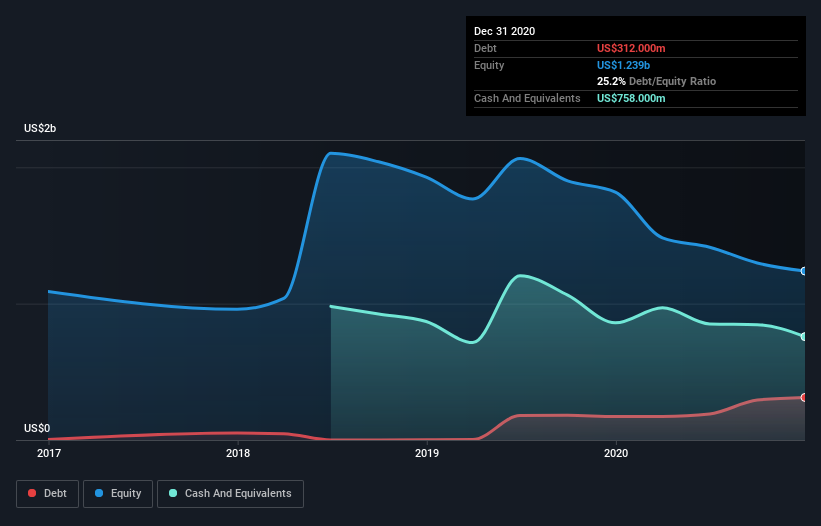Is Veoneer (NYSE:VNE) Using Debt In A Risky Way?
- Oops!Something went wrong.Please try again later.
The external fund manager backed by Berkshire Hathaway's Charlie Munger, Li Lu, makes no bones about it when he says 'The biggest investment risk is not the volatility of prices, but whether you will suffer a permanent loss of capital.' When we think about how risky a company is, we always like to look at its use of debt, since debt overload can lead to ruin. As with many other companies Veoneer, Inc. (NYSE:VNE) makes use of debt. But the more important question is: how much risk is that debt creating?
What Risk Does Debt Bring?
Generally speaking, debt only becomes a real problem when a company can't easily pay it off, either by raising capital or with its own cash flow. Part and parcel of capitalism is the process of 'creative destruction' where failed businesses are mercilessly liquidated by their bankers. While that is not too common, we often do see indebted companies permanently diluting shareholders because lenders force them to raise capital at a distressed price. By replacing dilution, though, debt can be an extremely good tool for businesses that need capital to invest in growth at high rates of return. When we think about a company's use of debt, we first look at cash and debt together.
See our latest analysis for Veoneer
How Much Debt Does Veoneer Carry?
You can click the graphic below for the historical numbers, but it shows that as of December 2020 Veoneer had US$312.0m of debt, an increase on US$172.0m, over one year. But on the other hand it also has US$758.0m in cash, leading to a US$446.0m net cash position.
How Healthy Is Veoneer's Balance Sheet?
According to the last reported balance sheet, Veoneer had liabilities of US$587.0m due within 12 months, and liabilities of US$462.0m due beyond 12 months. On the other hand, it had cash of US$758.0m and US$307.0m worth of receivables due within a year. So its total liabilities are just about perfectly matched by its shorter-term, liquid assets.
This state of affairs indicates that Veoneer's balance sheet looks quite solid, as its total liabilities are just about equal to its liquid assets. So while it's hard to imagine that the US$2.95b company is struggling for cash, we still think it's worth monitoring its balance sheet. Simply put, the fact that Veoneer has more cash than debt is arguably a good indication that it can manage its debt safely. There's no doubt that we learn most about debt from the balance sheet. But it is future earnings, more than anything, that will determine Veoneer's ability to maintain a healthy balance sheet going forward. So if you're focused on the future you can check out this free report showing analyst profit forecasts.
Over 12 months, Veoneer made a loss at the EBIT level, and saw its revenue drop to US$1.4b, which is a fall of 28%. To be frank that doesn't bode well.
So How Risky Is Veoneer?
Statistically speaking companies that lose money are riskier than those that make money. And in the last year Veoneer had an earnings before interest and tax (EBIT) loss, truth be told. Indeed, in that time it burnt through US$293m of cash and made a loss of US$545m. But at least it has US$446.0m on the balance sheet to spend on growth, near-term. Even though its balance sheet seems sufficiently liquid, debt always makes us a little nervous if a company doesn't produce free cash flow regularly. There's no doubt that we learn most about debt from the balance sheet. But ultimately, every company can contain risks that exist outside of the balance sheet. For example - Veoneer has 1 warning sign we think you should be aware of.
When all is said and done, sometimes its easier to focus on companies that don't even need debt. Readers can access a list of growth stocks with zero net debt 100% free, right now.
This article by Simply Wall St is general in nature. It does not constitute a recommendation to buy or sell any stock, and does not take account of your objectives, or your financial situation. We aim to bring you long-term focused analysis driven by fundamental data. Note that our analysis may not factor in the latest price-sensitive company announcements or qualitative material. Simply Wall St has no position in any stocks mentioned.
Have feedback on this article? Concerned about the content? Get in touch with us directly. Alternatively, email editorial-team (at) simplywallst.com.


